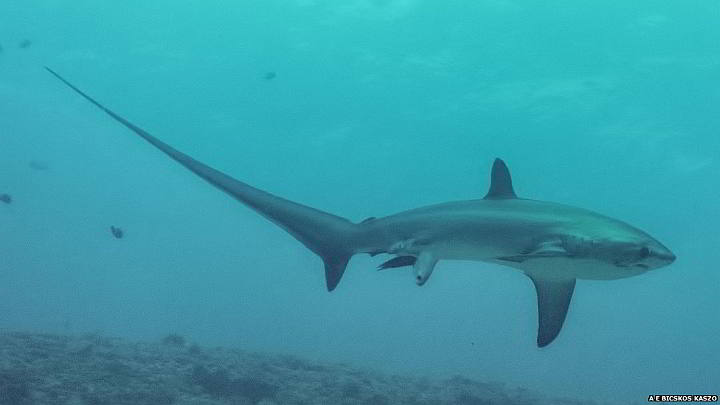The inclusion of thresher sharks in the Appendix II of the Convention on International Trade in Endangered Species (CITES) was lauded by stakeholders from Cebu who called for tougher measures to protect these marine creatures.
Representatives of Greenpeace Philippines, Department of Environment and Natural Resources (DENR-7), Bureau of Fisheries and Aquatic Resources (BFAR-7) made the announcement in a press conference at the Capitol Social Hall at 10 am Wednesday.
Thresher sharks had drawn tourists to flock in Daanbantayan town northern Cebu.
Greenpeace Philippines officer Vince Cinches said they are lobbying for a comprehensive national policy for the protection of this species.
“The national government can take insights from Cebu province that enacted a provincial ordinance seeking to punish fishermen illegally fishing thresher sharks in the provincial waters,” Cinches said.
The CITES Appendix heirarchy is used to determine the degree of protection needed to conserve endangered species, both flora and fauna. Usually, CITES Appendix entails a legal framework aimed for the protection of species.
The CITES’s official website stated that commercial trade of species belonging in Appendix II must be regulated.
The Tanon Strait Protected Seascape (TSPS) division of DENR-7 recommended that, unless scientific research shows an increase in the population of thresher sharks in Cebu, fishing and selling of these sharks must be prohibited.
“There are sightings of thresher sharks along Samboan and Moalboal. But (it is recommended) that no fishing will be conducted unless scientific research is conducted to prove an increase of their population,” stated DENR 7 – TSPS legal officer Steve Vincent Larona.
Last September 2014, the Provincial Board (PB) approved an ordinance that seeks to prohibit fishing, taking, and/ possessing of shark species unless such activities are covered by a special permit “intended for scientific and/education purposes”.
Anyone caught violating the ordinance will be fined P5,000. Their fishing equipment and boats will be confiscated, too.
Cinches said thresher sharks are still not covered by existing national laws on conservation of aquatic species since there’s no provision banning the trade of shark meat.
